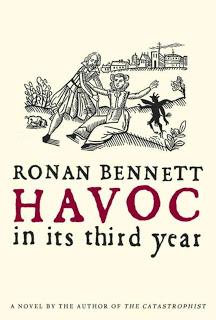
Ronan Bennett, Havoc, in Its Third Year (NY: Simon & Schuster, 2004):
"We live in bitter times and the world is divided in two: those who live inside the godly nation, and those outside. Inside is righteousness and strength. Outside is barbarism and terror. You chose to live outside."
"I chose rather not to live inside," Brigge said.
"It is the same," Adam said. "There is nothing in between" (p. 230).
I was impressed with Ronan Bennett's novel Havoc, which I read recently, both as a gripping historical study of an unspecified town in northern England as the Puritans rise to power in the 1630s, and as a meditation on the way in which absolutist puritanical groups continue to seek to assert theocratic power within various cultures of the contemporary world. Bennett sets the novel up to show how the extremist positions of purists on all sides set those who will not or cannot fit into either-or options up for exclusion and abuse.
As the Puritan faction ascends to dominance in his community, the novel's protagonist, John Brigge, a Catholic who refuses to take the route of outright recusancy but who attends Anglican services often enough to satisfy anyone watching him for signs of his commitment to the old religion, is faced with the choice of protecting himself and his family by colluding with the Puritans, or adhering to the dictates of his conscience.
Brigge's crisis of conscience is made more acute--and dangerous--when an Irish vagrant woman is, as he quickly recognizes, set up for murder charges in a trumped-up case of infanticide in which one of the local Puritan leaders is the ultimate malefactor. As his community's coroner, Brigge must make a ruling about how the infant died, and he is pressured to rule in a way that throws the powerless vagrant woman to the wolves, even when he recognizes that she's being sacrificed to bolster the power of the group rising to power in his community, and is not guilty of the crime with which she has been charged. The novel's plot turns on Brigge's unsuccessful attempt to avoid outright exclusion from his community and from its ruling elite, and his unsuccessful attempt to protect the woman wrongly charged with killing her child from similar abuse.
And so Havoc is, in short, a meditation on precisely what Brigge and his ward Adam, who has become infatuated with the purist ideology of the Puritan leaders of the community, discuss in the passage I've excerpted at the head of the posting. It's a meditation about the well-nigh incontestable pressure to choose one side or the other at times when absolutist ideologies do battle with each other--pressure that is well-nigh incontestable particularly when these ideologies claim to represent the divine will.
It's also a powerful reflection on a significant theme of Christian theology from the time of Augustine forward: this is the impossibility of dividing the world, short of the eschaton, into two clear, distinct halves, the city of God and the city of man, the holy and unholy, the righteous and unrighteous. It's a reflection on the very mixed motives of everyone within the world in which we all live, which is not yet the kingdom of God, and which inevitably falls short of the vision of the kingdom of God proclaimed by Jesus.
It's also a reflection about the damage we do when we take on ourselves the divine prerogative of sifting the wheat from the chaff short of the eschatological judgment, and when we declare our group the clean-handed, holy, and righteous elect, and all other groups we've decided to tag as not-us the dirty-handed, unholy, and unrighteous massa damnata which deserves exclusion from the community of the saints. At a point in time in which this exclusionary tendency, driven by purist theologies which permit some people to imagine themselves the divinely ordained judges and rulers of other people, now has such lethal influence in some sectors of culture and government in societies around the world, this novel has important pertinence--and should be widely read.

